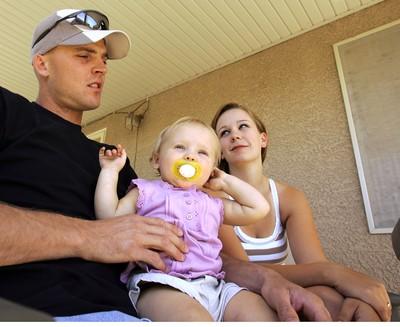Iraq news not all bad, Marine says

Marines are making progress in curbing violence in Iraq’s Anbar province, and they’re doing it with help from local Iraqis and with hope that freedom will soon take hold, said a lance corporal who just returned from the war zone.
With his wife and 13-month-old daughter by his side on the back porch of her parent’s Las Vegas home, Lance Cpl. Dustin Sholl said the American public is not hearing about the strides being made.
Instead, news out of Anbar and Baghdad has been mostly about casualties since the U.S. troop surge was launched there in February, triggering some of the bloodiest months since the 2003 invasion.
"You don’t see half of the good stuff that we do," Sholl, 25, said Wednesday.
"The only thing they talk about is these civilians died or these Marines died, or soldiers," he said. "They don’t hardly ever publish the good things we do, such as finding bad guys, finding IEDs (improvised explosive devices), weapons caches.
"They’re not telling you about the towns that we do well in where the population accepts us well and helps us out. They give us tips … on what to look for and who to look for. We accomplish huge tasks almost weekly like that."
Sholl, a Harrier attack jet maintainer, spent the past nine months deployed with the 15th Marine Expeditionary Unit at Al Asad Air Base near the border with Syria.
As he spoke, the multinational forces’ press desks in Iraq were issuing a typical day’s dispatches that described the accomplishments.
Six insurgents detained in Radwaniyah, read one. Another six "nabbed" in Iskandariyah, read another.
The list went on: Two terrorists killed, 11 detained; several explosive caches destroyed; construction of Rusafa regional courthouse "taking shape"; airstrikes target anti-aircraft weapons near Kalsu; suicide bomber attack foiled at police academy; 20 mortars, nine AK-47 assault rifles netted during a helicopter attack mission.
Sholl, whose hometown is Cochise, Ariz., said that during his tour he lost a few buddies, who were killed by a suicide bomber at a checkpoint.
After the troop surge, he said, the number of sporadic mortar attacks picked up at the base.
"We never saw the guys who were actually shelling us because they were miles away, but we had incidents on base," he said. "To hear mortars come in, it’s exciting at first. Then, after everything is done, you turn around and think about it. You never know where they’re going to land."
The troop surge dictated the need for more aircraft missions to protect coalition forces on the ground.
"The sorties we flew were unbelievable," Sholl said. "We were flying 24 hours a day, seven days a week."
Violence and casualties tied to the troop surge have fueled the anti-war movement in the United States, with calls by some elected officials for an immediate troop withdrawal. Sholl said he respects their opinions, but "when they do that, they’re not helping us."
"They have the right to do that, but the last thing we need to do is pull out of there before the job is done. We’ll get her done," he said.
"And people say, ‘Well, it’s not working for this and that.’ But we haven’t had another attack since Sept. 11. So we’ve pretty much locked them down, and we’ve got an eye on them. We haven’t had an attack since. … Just by that alone you can look and tell we are doing excellent work over there."
Sholl’s wife, Kristen, a 22-year-old Navy air traffic control veteran, said it was hard for her to raise their daughter, Julianna, after he was deployed and especially when his tour was extended.
When Sholl left last Sept. 13, Julianna was 3 months old. Now she’s a toddler who learned to walk and talk and grew teeth while he was gone.
"As time went on, I saw what good they were doing over there," Kristen Sholl said. "The fact that he’s over there to help people back here made me very, very proud."
After a "honeymoon" they intend to have at a Las Vegas resort, the Sholls will return to their home near Yuma Marine Corps Air Station in Arizona, where he will prepare for another nine-month overseas tour, probably in Iraq.